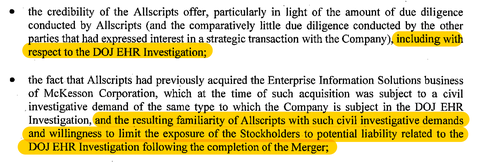Practice Fusion, an EHR vendor once reportedly worth as much as $1.5 billion with goals of going public, sold to Allscripts early this month for just $100 million.
The purchase price was surprising given the company's projected growth and the fact that investors sunk more than $157 million into the company. But a series of events in 2017, including a Department of Justice investigation, scared off investors and ultimately trampled the company’s value, according to confidential documents obtained by FierceHealthcare.
Even as it attracted attention for its financial success, behind the scenes, Practice Fusion was shopping itself to potential buyers. By November 2015, months before The New York Times reported the company was exploring an initial public offering the company had contacted more than two dozen companies for “a possible business combination or strategic transaction,” according to the documents. Practice Fusion, for its part, denies that it ever hired a firm to pursue an IPO.
RELATED: Allscripts to acquire Practice Fusion for $100M
By May 2017, after contacting 40 potential suitors, Practice Fusion received two separate offers to purchase the company for as much as $250 million.
One of those offers came from Allscripts, which submitted a nonbinding letter of intent in May 2017 to purchase Practice Fusion for between $225 million and $250 million, more than twice as much as it would end up paying for the company seven months later.
But Allscripts pulled its offer a month later when another EHR vendor, eClinicalWorks, settled with federal prosecutors for $155 million to resolve allegations that it falsified EHR certification, according to the documents. Another unnamed company, which gave Practice Fusion a verbal offer of $175 million to $250 million in March, also withdrew its offer.
In fact, Practice Fusion had received an inquiry from the U.S. Attorney’s Office for the District of Vermont in March 2017 examining the company’s compliance with the EHR certification program overseen by the Office of the National Coordinator for Health IT.
The eClinicalWorks settlement suddenly clarified just how expensive a similar legal battle could be.
RELATED: eClinicalWorks settlement hints at broader certification infractions throughout the EHR industry
With the help of Evercore Group and a special committee initially assigned to explore a potential sale in 2015, Practice Fusion continued discussions with Allscripts and the other unnamed company. Negotiations heated back up in December, but this time at a far lower price point.
Practice Fusion, unable to resolve the DOJ investigation into its EHR certification program compliance, ultimately accepted Allscripts’ offer of $100 million. Practice Fusion eventually declined two other offers to buy the company for as much as $145 million because Allscripts provided a key assurance: It would absorb any potential fallout from the DOJ investigation.

“It suggests there might be some fire where there is smoke when it comes to Practice Fusion” and the DOJ investigation, says Matt Fisher, a partner with Mirick O’Connell who reviewed the documents at the request of FierceHealthcare.
The DOJ investigation was not the only consideration for Practice Fusion. In a letter to shareholders, Practice Fusion cited several other factors, including a dwindling EHR market and its prospects as a standalone company.
The company also found itself in a financial rut. After reporting 70% revenue growth in 2015, the company saw revenue climb just 13% in 2016. Through the first nine months of 2017, Practice Fusion saw revenue drop nearly $4 million compared to the same period the previous year.
But the legal assurances from Allscripts were a significant sticking point, and Practice Fusion pointed specifically to Allscripts’ “willingness to limit the exposure of the stockholder potential liability related to the DOJ EHR investigation,” according to the document distributed to shareholders. The company also cited the “likely multi-year period and multi-million dollar expenses” associated with a DOJ investigation.

Allscripts also had experience with civil investigations, Practice Fusion noted. McKesson was the subject of a similar DOJ investigation a month earlier when Allscripts agreed to buy the company’s health IT portfolio for $185 million.

According to a Practice Fusion spokesperson, the company believes the eClinicalWorks settlement fundamentally changed the EHR market, reducing valuations across the board. But the ongoing DOJ investigation did have a significant impact on Allscripts' valuation of Practice Fusion, according to the spokesperson, and the company ultimately decided to approve the acquisition believing it was the best path forward for the company.
Shareholders, meanwhile, have been left with nothing to show for the deal. As CNBC reported earlier this week, documents show management carveouts as part of the deal ranged from $750,000 for Stacey Rubin, vice president of people, to $7 million for CEO Tom Langan. Four other executives are set to receive more than $2 million.
What will come of the investigation remains unclear. A spokesperson for the Vermont U.S. Attorney's Office did not return calls requesting comment, and a DOJ spokesperson said the agency does not confirm or deny the existence of an investigation.
Allscripts spokesperson Concetta Rasiarmos said the company "does not as a matter of policy, speak publicly to specific terms of outstanding acquisitions." An SEC filing by Allscripts on Jan. 5 acknowledges the DOJ investigation and states that a subsequent legal proceeding "could materially and adversely impact our business, financial condition and operating results."
But the risk of a multimillion-dollar legal battle tied to the DOJ investigation, coupled with the eClinicalWorks settlement, was enough to drive down the Practice Fusion’s asking price.
“It was a reasonable fear that really depressed the value,” Fisher says.